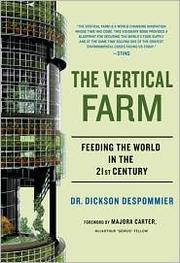Check nearby libraries
Buy this book

There comes an idea every once in a while that has changes the ways in which we live and help us to live longer and to prosper. The next truly great idea, originally introduced and developed by Dr. Dickson Despommier, is that of vertical farming, or farming vertically, however you want to define it. Dr. Despommier is a professor at Columbia University in the Department of Environmental and Health Services and started this concept back in 1999, which has gained considerable steam and attention this past decade, including the October 2010 publishing of his research entitled, The Vertical Farm: Feeding the World in the 21st Century.
In the beginning, Despommier briefly goes over the origins of agriculture, and how and why it occurred in different areas around the Earth, around the same period of time. Next, he begins to discuss how the agriculture of today came to be and the innovations that allow us to even reach the crop yields that we have reached. He presents what we absolutely need to change about our farming practices, (i.e., herbicides, pesticides, synthetic fertilizers, etc), and offers insightful ways to help bring these changes.
In the next section, he presents how vertical farms will be constructed, where they will be utilized, and how they will be funded initially before they can turn a profit. Here are the advantages that he lists for vertical farming: year-round crop production, no weather-related crop failures, no agricultural runoff, allowance for ecosystem restoration, no use of pesticides, herbicides, or fertilizers, use of 70-95 percent less water than traditional farming, greatly reduced food transportation costs, more control of food safety and security, new employment opportunities, purification of grey water to drinking water, and animal feed from postharvest plant material.
It is not a question of vertical farming happening; it’s a matter of when? We, as a species, have literally run out of land to farm with an alarmingly fast global population growth. At this current rate, we will need another Brazil to feed all these extra mouths, and with traditional farming methods the majority of those mouths will go unfed. These farms will be in abandoned business buildings being reused, instead of totally new construction, which takes many resources. I hope that as a citizen of a nation known for innovation and taking the next step to solve our problems, we actually want to be able to grow enough food for our growing population. Urban vertical farming and the use of abandoned lots in cities will be and have to be used to feed our communities. The time is now to make sound decisions not only for the present but for the next several generations as well. This is one of the best ideas I have ever come across, and I sincerely ask you inform yourself about vertical farming so we all can push for cleaner and more efficient ways to grow the food each and every one of us require to live.
Check nearby libraries
Buy this book

Showing 1 featured edition. View all 1 editions?
| Edition | Availability |
|---|---|
|
1
The Vertical Farm: Feeding the World in the 21st Century
2010, St. Martin's Press, Thomas Dunne Books/St. Martin's Press
0312611390 9780312611392
|
aaaa
Libraries near you:
WorldCat
|
Book Details
Classifications
ID Numbers
Community Reviews (0)
Feedback?| February 28, 2020 | Edited by MARC Bot | remove fake subjects |
| May 15, 2019 | Edited by MARC Bot | import existing book |
| July 13, 2017 | Edited by Mek | adding subject: Internet Archive Wishlist |
| January 22, 2011 | Edited by Jameson Rohrer | A brief introduction to the book. |
| October 3, 2010 | Created by 68.189.174.57 | Added new book. |










